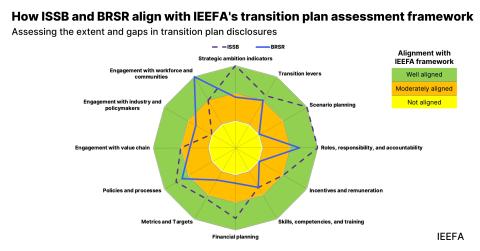A strategic fossil fuel divestment policy would strengthen the British Columbia Teachers' Pension Plan
Download Full Report
View Press Release

Key Findings
BCI has begun to address the risks associated with continued fossil fuel investments, but much more needs to be done—divestment will make the British Columbia Teachers’ Pension Plan fund stronger and more resilient.
Implementing IEEFA’s divestment recommendations would allow fund managers and pension fund beneficiaries to move capital in the direction of both climate solutions and economic growth.
BCI currently holds billions of dollars in fossil fuel reserve and infrastructure investments, yet its fragmented disclosures provide only partial insight into the full extent of its fossil fuel investments.
BCI has determined if global temperatures rise to 2oC, its portfolio will lose 5.1 percent of its value, putting $11 billion of its investments—$2 billion attributable to BCTPP beneficiaries—at risk of capital loss.
Executive Summary
The British Columbia Teachers’ Federation (BCTF) adopted a resolution in 2022 requesting its pension fund representatives to begin divesting assets from fossil fuel companies. The resolution, made at the request of union members, has initiated a dialogue within the stakeholder community as to how divestment from fossil fuels could occur. This report details the policy and fiduciary imperatives to achieve divestment; key analyses and actions required to meet the challenge; and the potential to convert the challenge into new opportunities to achieve a stronger, more resilient pension fund.
IEEFA proposes expanding the investment options offered to the British Columbia Teachers’ Pension Plan (BCTPP) and other funds under the current management paradigm to create a seamless set of decarbonized alternatives that run parallel to the existing investment strategies that include fossil fuels. Implementing IEEFA’s proposal would allow fund managers and pension fund beneficiaries to move capital in the direction of climate solutions and economic growth.
Climate change poses financial risks, and financial action should be taken to address the risks.
Climate change poses financial risks, and financial action should be taken to address the risks. The market position of fossil fuel companies is weak, and its outlook is negative. Alternative investment products now exist for a prudent, well-managed, orderly process to reduce and ultimately eliminate fossil fuels from the BCTPP.
The BCTPP, established to provide retirement income security for teachers and administrators, has an opportunity—and a duty—to strengthen and improve its fund’s stability by protecting it against the risks posed by fossil fuel investments. The British Columbia Investment Management Company (BCI), as the plan’s investment management services provider, has taken important preliminary steps toward addressing this risk. Much more, however, needs to be done.
IEEFA analyzed annual reports, audits, policy documents and other materials related to the BCTPP and BCI’s role in providing investment management services to identify the steps that have been taken and still need to be taken to address risks to the BCTPP from its investments in fossil fuels. Considering the information in the context of the fossil fuel industry’s condition and outlook, as well as the disruptive impacts of climate change, IEEFA found:
- BCI holds billions of dollars in fossil fuel reserve and infrastructure investments. Yet its fragmented disclosures provide only partial insight into the full extent of its fossil fuel investments. BCI’s private market investments, which are its most carbon-concentrated, are among its least transparent. Unlike assets in transparent, publicly listed portfolios, fossil assets in private, unlisted portfolios are subject to less public scrutiny and disclosure requirements. Transparency would improve planning and accountability.
- The rationale for divestment is anchored in sound financial and corporate management principles, given that:
- The fossil fuel industry’s financial performance has declined substantially over time and now faces unprecedented competition. The loss of market share and subpar performance—despite the market disruption caused by the invasion of Ukraine and ensuing price hikes—leave the energy sector today with a 5 percent share of the Standard and Poor’s 500-stock index, down from its peak in 1980, when it commanded 29 percent of the market.
- Climate change poses risks to BCI’s portfolio. BCI has determined if global temperatures rise to 2oC, its portfolio will lose 5.1 percent of its value, putting $11 billion of its investments—$2 billion attributable to BCTPP beneficiaries—at risk of capital loss. A loss of $2 billion would exceed the BCTPP’s current actuarial surplus.
- BCI’s current climate action plan needs to be strengthened. For example:
- Relying on an engagement strategy not backed up by a divestment option is unlikely to succeed. Fossil fuel companies have demonstrated a poor track record in meeting net-zero commitments. Divestment would put the decision to reduce financed emissions in the hands of the investment board responsible to the funds’ members and retirees.
- Relying on investments in “climate solutions” has made progress but is limited. BCI’s definition of climate solution investment includes entities that derive just 10 percent of their revenue from green products or services, which can leave the portfolio exposed to significant energy transition risks.
- BCI’s arguments against adopting a divestment strategy do not stand up to scrutiny.
- Evidence shows divestment does not increase investment risks or costs, and does not negatively affect returns. The financial impact has been positive or neutral.
- A divestment strategy does not eliminate shareholders’ rights to engage with companies to spur changes. Rather, divestment and engagement work together strategically.
- Diverting investment from the fossil fuel industry, rather than just transferring emissions to a new owner, can enhance investment in renewable solutions that cut carbon pollution.
- The BCTPP board of trustees has a fiduciary duty to address climate change as a risk factor and to safeguard the long-term value of investments. Since more risks from climate change will develop in the future, the board should act impartially in the interests of both current and future beneficiaries.
The current measures taken by BCI, while commendable, are insufficient given the degree and severity of the risks. A prudent fiduciary should work expeditiously to achieve:
- Rapid decarbonization of the existing BCTPP investment portfolio; and
- Exclusion of further investment in fossil fuel reserves or infrastructure, or in industries that use fossil fuel as feedstock.
Although many potential routes to portfolio decarbonization exist, BCI should consider expanding its fund offerings by introducing a new line of sustainable pooled funds that run parallel to and complement the existing menu of options for equities, bonds, real estate, private equity and alternative investments. This would provide trustees with a set of seamless investment options to tackle climate risk in line with their fiduciary obligations, investment philosophies, current asset allocation strategies and return targets. A prudent strategy to divest from portfolios containing fossil fuels is in the best interests of the BCTPP’s current and future beneficiaries, and will fulfill the fiduciary duty of the BCTPP and BCI to protect income security for teachers and administrators in retirement.















